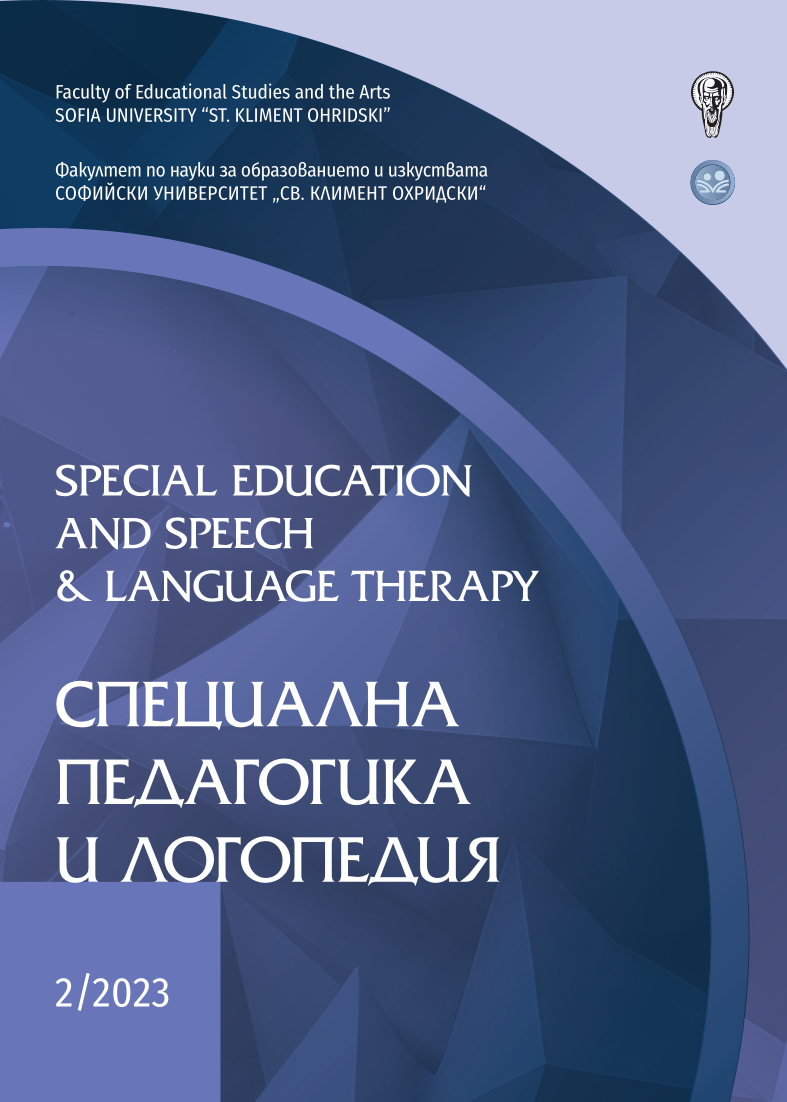Challenges faced by primary teachers in mainstream schools
Keywords:
inclusive education, general education teachers, mainstream schoolsAbstract
Article describes the results of interviews and the responses of 123 general education teachers in mainstream schools, revealing their assessment of the support, difficulties in discrimination and pathways for facilitation of their work with the four categories of students covered by the inclusive education - those with special educational needs, at risk, gifted and chronically ill. The aim of the study is to outline guidelines from the perspective of in-service teachers on the main difficulties and opportunities to improve the effectiveness of their daily work. Factors related to perceived stress and teachers' suggestions for improving their working conditions are also reported. The results show differentiated needs and support for teachers to improve their performance. Key challenges outlined are the work with students with SEN and team working. Factors categorised as ''extrinsic'' and ''intrinsic'' influencing teaching practice are discussed. The results will be used as input for the development of brief handbooks and screening tools to foster classroom management with a heterogeneous student population.
References:
Bakracheva, M. & Totseva, Y. (2022). Aspects of pedagogical communication in conditions of crisis. In: Pedagogical communication in conditions of crisis. Proceedings of a scientific-practical conference, 11–55. S.: Faber.
Bakracheva, M. & Totseva, Y. (2023). Burnout, boreout and mobbing experienced by teachers in kindergartens and schools in the conditions of COVID-19, Pedagogy, 95(2), 190–204. doi: 10.53656/ped2023-2.05
Totseva, Y. & Bakracheva, M. (2022). Digital competences of kindergarten and school teachers in the conditions of the crisis caused by the COVID pandemic. In: Pedagogical communication in conditions of crisis, Proceedings of a scientific-practical conference, 56–75. S.: Faber
Zamfirov, M., Evgenieva, E. & Bakracheva, NM. (2023a). Assessment of general education and resource Teachers for the work in the paradigm оf inclusive education. Pedagogy, 95(5), 589–608.
Zamfirov, M., Evgenieva, E. & Bakracheva, NM. (2023b). Self-assessment of general education and resource teachers for working in the paradigm of inclusive education. Strategies of Education and Science Policy, 31(3), 239–255.
Calkins, H. M. (2019). Parent and Teacher Perceptions of the Importance of Social-Emotional Learning in the Schools, Theses and Dissertations, 1166. Retrieved from: https://ir.library.illinoisstate.edu/etd/1166
Čopková, R. (2021). The relationship between burnout syndrome and boreout syndrome of secondary school teachers during COVID-19. Journal of Pedagogical Research, 5(2), 138–151. doi: 10.33902/JPR.2021269824.
Guillén-Gámez, F. D. & Rodríguez-Fernández, R. (2022). Meta-Analysis on the Attitudes of Active Teachers About the Use of Educational Technology According to Gender. Contemporary Educational Technology, 14(1), ep339. doi: 10.30935/cedtech/11408.
Moon, B & McCluskey, J. (2021). A Longitudinal Study of Teacher Victimization at Schools: Prevalence, Predictors, and Negative Consequence. Retrieved from https://www.ojp.gov/pdffiles1/nij/grants/306556.pdf
Müller, L. & Goldenberg, G. (2020). Education in Times of Crisis: The Potential Implications of School Closures for Teachers and Students: A Review of Research Evidence on School Closures and International Approaches to Education during the COVID-19 Pandemic. London: Chartered College of Teaching Retrieved from https://my.chartered.college/wp-content/uploads/2020/05/CCTReport070520_FINAL.pdf
Prakapas, R., Merfeldaite, O., Railienė, A., Indrašienė, V., Jegelevičienė, V., Gusauskiene, M. & Dirzyte, A. (2024). Teacher Victimization by Students, Their Parents, and School Staff: Prevalence and Links with Teachers’ Life Satisfaction in a Lithuanian Sample. Education Sciences, 14. 10.3390/educsci14020163.
Pressley, T. (2021). Factors Contributing to Teacher Burnout During COVID-19, Educational Researcher, 50(5), 325–327. doi: 10.3102/0013189X211004138.
Saha, S. & Dutta, T. (2020). A Study on the Psychological Crisis during the Lockdown Caused Due to COVID-19 Pandemic. Afr. J. Biol. Med. Res, 3(2), 41–49.
Sarikaya, M. (2021). An investigation of the relationship between COVID-19 anxiety and burnout among music teachers”. International Journal on Social and Education Sciences (IJonSES), 3(4), 789-806, doi: 10.46328/ijonses.274.
Sokal, L. J., Trudel, L. E. & Babb, J. (2020a). Canadian Teachers’ Attitudes toward Change, Efficacy, and Burnout during the COVID-19 Pandemic. Int. J. Educ. Res. Open, 1, 100016, 2020. doi:10.1016/j.ijedro.2020.100016.
Sokal, L. J., Trudel, L. E. & Babb, J. (2020b). Supporting Teachers in Times of Change: The Job Demands-Resources Model and Teacher Burnout during the COVID-19 Pandemic. International Journal of Contemporary Education, 3(2), 67–74. doi: 10.11114/ijce.v3i2.4931.
Uzeyir, O. (2021). A meta-analytic review of emotional intelligence in gifted individuals: A multilevel analysis. Personality and Individual Differences, 171, 110503, doi: 10.1016/j.paid.2020.110503
Weißenfels, M., Klopp, E. & Perels, F. (2022). Changes in Teacher Burnout and Self-Efficacy During the COVID-19 Pandemic: Interrelations and e-Learning Variables Related to Change, Frontiers in Education, 6, 736992. doi: 10.3389/feduc.2021.736992
Weißenfels, M., Klopp, E. & Perels, F. (2022). Changes in Teacher Burnout and Self-Efficacy During the COVID-19 Pandemic: Interrelations and e-Learning Variables Related to Change, Frontiers in Education, 6, 736992. doi: 10.3389/feduc.2021.736992
Downloads
Published
Issue
Section
License
Copyright (c) 2025 Милен Замфиров, Маргарита Бакрачева

This work is licensed under a Creative Commons Attribution 4.0 International License.

